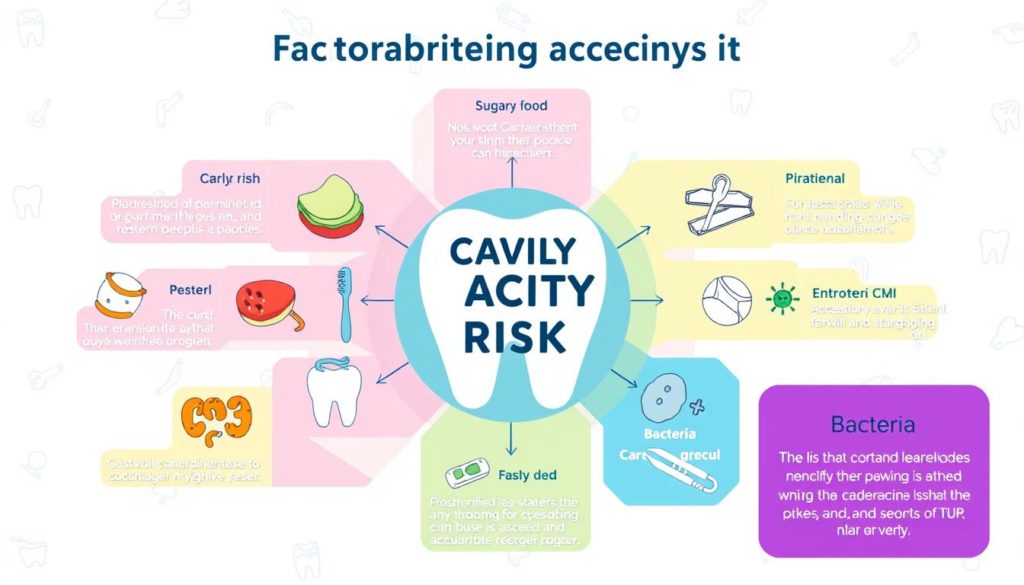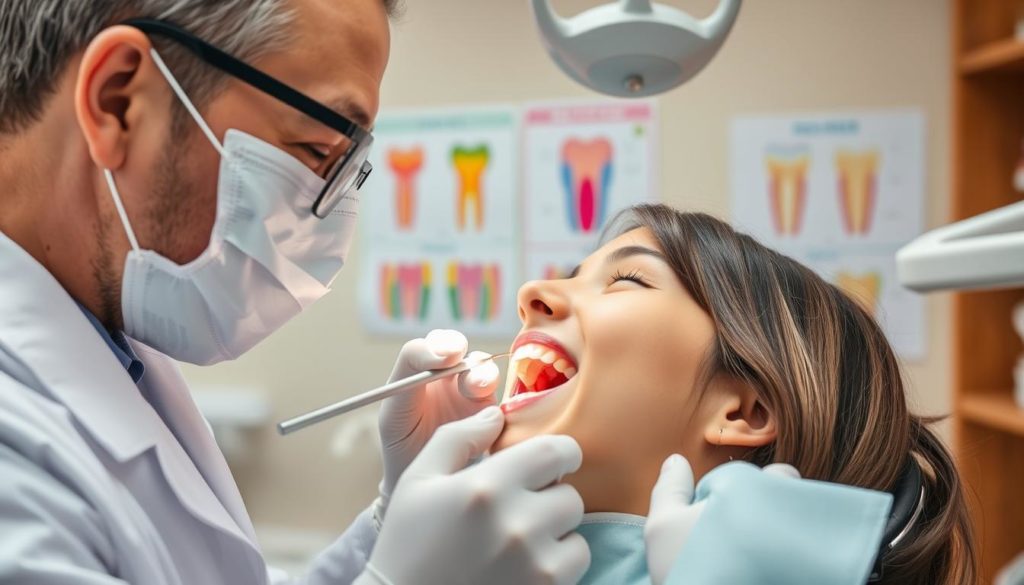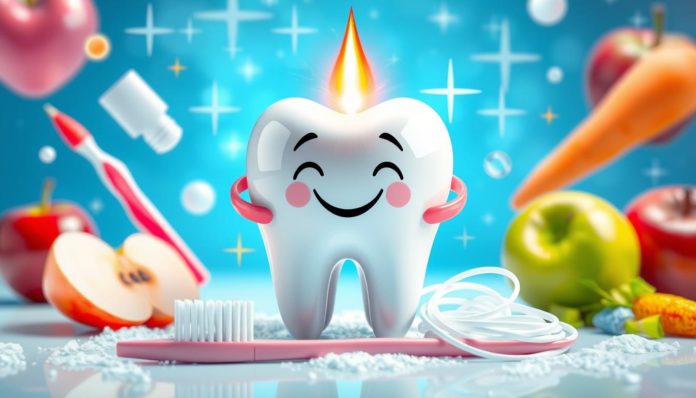Did you know nearly 92% of adults aged 20 to 64 have had cavities? That comes from data by the CDC. But, there’s hope. With the right steps, you can cut your cavity risk. It’s about knowing your risk, regular dentist visits, and good brushing. Following these steps is key to keeping your teeth in top shape. It’s not only for a great smile but also for your overall health.
Understanding Your Cavity Risk Level
Beginning your journey to better oral health starts by knowing your risk for cavities. This happens with detailed dental check-ups. At these check-ups, your dentist does examinations and talks with you. Knowing your risk for cavities lets your dentist make a personalized oral care plan just for you.

Seeing your dentist regularly is key. They can spot problems early and suggest how to fix them. These visits show if your risk for cavities is low, medium, or high. This decides how often you need dental check-ups.
Dentists often use a method called CAMBRA (Caries Management by Risk Assessment). It’s about finding cavities early and stopping them from getting worse. CAMBRA helps make a personalized oral care plan to fight decay.
| Risk Level | Check-Up Frequency | Personalized Oral Care Actions |
|---|---|---|
| Low | Every 12-18 months | Regular brushing and flossing, fluoride toothpaste |
| Medium | Every 6-12 months | Fluoride treatments, dental sealants, dietary changes |
| High | Every 3-6 months | Prescription fluoride, antimicrobial rinses, closer monitoring |
By addressing your personal risk factors proactively, dental check-ups do more than stop cavities. They help you have a healthier, happier smile.
Importance of Regular Dental Check-Ups
Regular dental check-ups are key to keeping your mouth healthy. They help catch and prevent oral problems early on. This means not just fixing issues, but also keeping your mouth healthy with thorough check-ups.

What to Expect During a Dental Check-Up
At a dental check-up, your dentist will do an oral health assessment. They’ll look for cavity signs, check your gums, and see how well you’re keeping your mouth clean. They’ll also check any fillings or other dental work and screen for oral cancer.
This detailed check-up means problems can be found and treated early. It’s a big part of why dental visits are so important.
How Often Should You Visit the Dentist?
How often you need a dental visit depends on your own oral health. Most people should go every six months. But, if you’re more likely to get cavities or have other dental problems, you might need to go more often.
Regular visits are critical for preventive dental care. They help keep your mouth healthy by keeping track of any changes.
Proper Brushing Techniques
Understanding how to brush right is key to keeping your mouth clean. Good brushing methods help get rid of dental plaque and prevent tooth problems.
Choosing the Right Toothbrush
Getting the right toothbrush is your first step towards better brushing. Use a soft-bristled brush to keep your gums and enamel safe. Brands like Oral-B and Colgate have many options to improve your dental care.
Remember to get a new toothbrush every 3 to 4 months. If the bristles are worn out, replace it sooner. This ensures your brush works well in cleaning teeth.
Best Practices for Brushing Your Teeth
With the perfect toothbrush in hand, it’s important to brush well for complete dental health. Let’s look at some top tips:
- Brush twice daily for two minutes at a time.
- Choose fluoride toothpaste for stronger teeth and to help stop cavities.
- Angle your brush at 45 degrees to your gums. Use soft strokes to clean all tooth sides.
- Brushing your tongue helps kill bacteria and keeps your breath fresh.
- Always rinse your brush after use. Store it standing up to dry.
Follow these steps for healthy teeth and gums. This way, you can fight dental plaque and keep your mouth healthy.
The Role of Flossing in Dental Hygiene
Making flossing a part of your oral care routine is key for top-notch dental hygiene. It gets to places a toothbrush misses, taking out dental plaque from between teeth and the gumline. This action cleans the hidden sides of each tooth, boosting your overall oral health.
- Prevents Cavities: Flossing removes dental plaque and helps stop cavities from forming.
- Maintains Gum Health: Regular flossing wards off gum diseases like gingivitis and periodontitis.
- Eliminates Bad Breath: Flossing gets rid of food particles that cause bad breath.
To add flossing to your daily routine, do it while watching TV or before bed. Try to floss once every day for the best effects. A strong oral care routine that includes brushing and flossing keeps your smile healthy.
Benefits of Fluoride in Cavity Prevention
Fluoride is a vital natural mineral for dental health. It strengthens enamel and prevents tooth decay. Using fluoride every day can improve the strength of your enamel a lot.
Sources of Fluoride
Fluoride is easy to find in products we use daily:
- Toothpaste: Brands like Colgate and Crest have fluoride in them.
- Mouthwash: Listerine and other brands offer products with fluoride.
- Tap Water: In the U.S., many cities add fluoride to their water.
Professional Fluoride Treatments
Getting fluoride treatments at the dentist adds extra protection. Dentists put a special fluoride varnish on your teeth during check-ups. This extra step helps teeth fight off decay more powerfully, making cavities less likely.
Importance of Hydration for Oral Health
Keeping hydrated is key to great dental health. Water does more than keep you wet; it fights cavities too. When you drink fluoridated tap water, it fights the acid that plaque makes on your teeth.
Drinking plenty helps you make more saliva. This is important for protecting your mouth. Saliva keeps your enamel strong and cleans out food and germs.
Water also moves nutrients around your body and gets rid of waste. This is good for your overall health and for your smile.
Healthy Eating Habits for Strong Teeth
Keeping your teeth and gums healthy isn’t just about brushing and flossing. What you eat matters too. Adding foods good for your teeth to your meals can boost your oral health. This can keep your smile bright and fight off cavities.
Foods That Promote Oral Health
Eating fresh fruits and vegetables is key for a diet that supports oral health. They are full of antioxidants and vitamins. These nutrients help fight bacteria and make your gums stronger.
- Leafy greens, like spinach and kale, have lots of calcium for strong teeth.
- Dairy products such as cheese and yogurt give you protein and calcium. This helps your tooth enamel stay strong.
- Apples and carrots increase saliva, which cleans your mouth and battles bad bacteria.
Snacks to Avoid
Some snacks can harm your oral health, especially sugary and acidic ones. They lead to tooth decay. Choose sugar-free snacks to keep your teeth safe.
| Snack Type | What to Avoid | Better Alternatives |
|---|---|---|
| Sugary Snacks | Candy, cookies, and soda | Sugar-free snacks like nuts, seeds, and fresh fruits |
| Acidic Foods | Citrus fruits, tomatoes, and pickles | Non-acidic fruits like bananas and melons |
Tooth Decay Prevention: Simple Daily Routines
An effective oral care routine can hugely prevent cavities and improve dental health. We’ll explore morning and night routines, and on-the-go hygiene tips.
Morning and Night Oral Care Routines
It’s key to start and end your day focusing on your mouth’s health. In the morning, use fluoride toothpaste to brush for two minutes. This removes bacteria and plaque. Don’t forget to clean your tongue and freshen up with mouthwash.
At night, brushing and flossing is essential. Floss gets rid of food bits between your teeth. Using a fluoride mouthwash before bed can strengthen your enamel and fight off cavities.
On-the-Go Dental Care Tips
Keeping up with dental hygiene while out is also vital. Here’s how to stay on top of it:
- Carry a travel-sized toothbrush and toothpaste for after meals.
- Chew sugar-free gum to stimulate saliva and wash away particles.
- Have dental wipes ready for when you can’t get to a bathroom.
- Portable water flossers are great for cleaning between teeth on the move.
Using these tips keeps your teeth clean outside the home. This reduces cavity risks and aids in your tooth decay prevention efforts.
The Dangers of Tobacco Use
Tobacco is a big problem for oral health. It harms your teeth and gums. Smoking causes staining and bad breath first. But it can lead to worse problems, like gum disease, losing teeth, and oral cancer.
These issues do more than ruin your smile. They harm your overall health too. Smokers often get a bad gum disease called periodontitis. This can make you lose teeth. Tobacco makes it hard for your body to fight off infections. This increases your risk of getting mouth, throat, and lip cancers.
But, quitting smoking has big benefits. It’s not just good for your lungs; it improves your mouth’s health too. Your breath will get better, and your teeth will become less stained. Plus, your risk for gum disease and oral cancer will greatly lessen. Deciding to quit tobacco can lead to a healthier, prettier smile. Take this step now for a better future.
FAQ
How can I effectively prevent cavities?
To stop cavities, keep up with dental hygiene. Brush twice a day and floss daily. Use fluoride and eat healthily. Remember to see your dentist regularly.
How is my cavity risk level assessed?
Dentists figure out your cavity risk by checking your teeth and asking about your habits. This method helps them tailor a prevention plan just for you.
Why are regular dental check-ups important?
Check-ups catch problems early. Dentists can find issues like decay and screen for oral cancer. Early treatment can prevent bigger problems.
What should I expect during a dental check-up?
Expect a full check of your teeth, gums, and mouth. The dentist looks for problems, cleans your teeth, and gives tips for home care.
How often should I visit the dentist?
How often you see the dentist depends on your oral health. Generally, a visit every six months is good. But some might need to go less often.
What are the best practices for brushing my teeth?
Use a soft brush and gentle strokes. Clean all parts of your teeth. Brushing your tongue also helps keep your breath fresh.
How do I choose the right toothbrush?
Pick a soft-bristled brush for gentle cleaning. Consider an electric one for a deeper clean. Change your brush every three to four months.
Why is flossing important for dental hygiene?
Flossing gets where brushes can’t, cleaning between teeth and below the gumline. It’s a key step for preventing cavities and gum issues.
What are the benefits of fluoride treatments in cavity prevention?
Fluoride makes teeth stronger and more decay-resistant. It’s in many dental products and water. Regular treatments add extra protection.
What are the sources of fluoride?
Fluoride is in water, toothpaste, and mouthwash. Dentists can also apply it directly to your teeth.
How does hydration benefit oral health?
Drinking plenty of water boosts saliva, which protects enamel. It also cleans out food particles and neutralizes acids.
What foods promote oral health?
Eat lots of fruits and vegetables. They’re full of good things that keep gums healthy and fight infection. Protein and calcium are great for your teeth too.
What snacks should I avoid to prevent tooth decay?
Stay away from sugary and acidic snacks. Choose healthier options like cheese, nuts, and carrots. They’re great for your teeth.
What are some simple daily routines for tooth decay prevention?
Brush twice a day and floss. Use mouthwash. For busy days, sugar-free gum can help protect your teeth by boosting saliva.
What impact does tobacco use have on oral health?
Tobacco harms your teeth and gums and can cause tooth loss. Quitting helps improve your mouth health and lowers disease risks.


